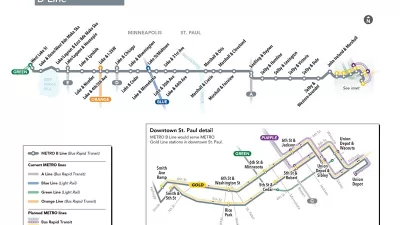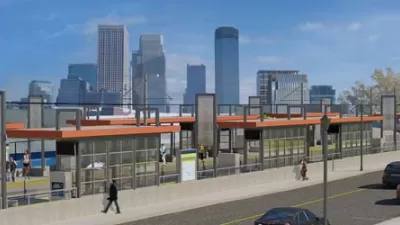Citing the model of Houston's local-tax-funded Red Line, a writer argues for a local sales tax in the Twin Cities to support urban transit investments.
Brendan Slotterback writes about the lessons in local funding he brought back to the Twin Cities after a visit to Houston's Red Line—that project's $324 million price tag was covered completely by local funds generated by Houston's one-penny sales tax.
Slotterback, however, finds that the Metropolitan Council’s draft 2040 Transportation Policy Plan (called Thrive MSP) proposes little in the way of large-scale, urban transit infrastructure: "…we’re apparently done building LRT projects through 2040. Over the next 25 years, Minneapolis and Saint Paul alone are expected to add over 130,000 people, and for the most part we’re just planning to upgrade some buses (under the optimistic funding scenario)."
Slotterback's argument is set in the context of ongoing debate about statewide legislation called Move MN, but the political compromises and debate likely to surround that bill prompts him to ask: "So what if Minneapolis and Saint Paul just wanted to build transit on our own? What if we had a one penny sales tax dedication?" Slotterback goes on to pencil out just how much such a source of local revenue would get the Twin Cities.
FULL STORY: One Penny

Maui's Vacation Rental Debate Turns Ugly
Verbal attacks, misinformation campaigns and fistfights plague a high-stakes debate to convert thousands of vacation rentals into long-term housing.

Planetizen Federal Action Tracker
A weekly monitor of how Trump’s orders and actions are impacting planners and planning in America.

In Urban Planning, AI Prompting Could be the New Design Thinking
Creativity has long been key to great urban design. What if we see AI as our new creative partner?

King County Supportive Housing Program Offers Hope for Unhoused Residents
The county is taking a ‘Housing First’ approach that prioritizes getting people into housing, then offering wraparound supportive services.

Researchers Use AI to Get Clearer Picture of US Housing
Analysts are using artificial intelligence to supercharge their research by allowing them to comb through data faster. Though these AI tools can be error prone, they save time and housing researchers are optimistic about the future.

Making Shared Micromobility More Inclusive
Cities and shared mobility system operators can do more to include people with disabilities in planning and operations, per a new report.
Urban Design for Planners 1: Software Tools
This six-course series explores essential urban design concepts using open source software and equips planners with the tools they need to participate fully in the urban design process.
Planning for Universal Design
Learn the tools for implementing Universal Design in planning regulations.
planning NEXT
Appalachian Highlands Housing Partners
Mpact (founded as Rail~Volution)
City of Camden Redevelopment Agency
City of Astoria
City of Portland
City of Laramie




























